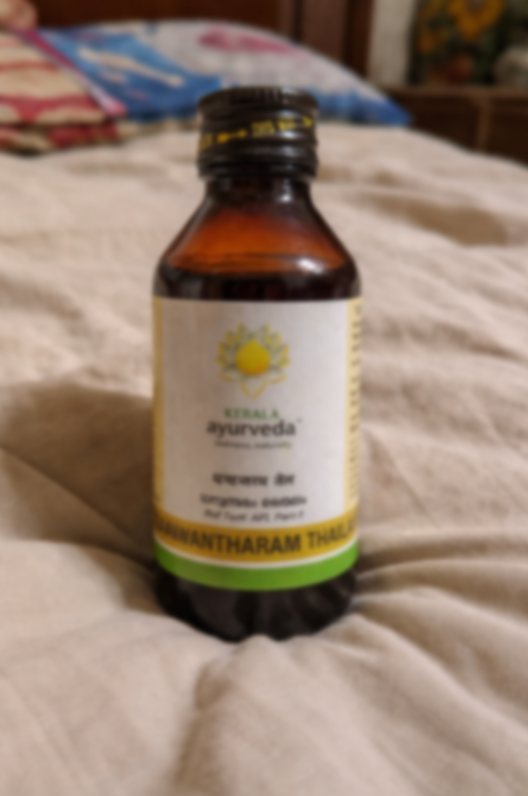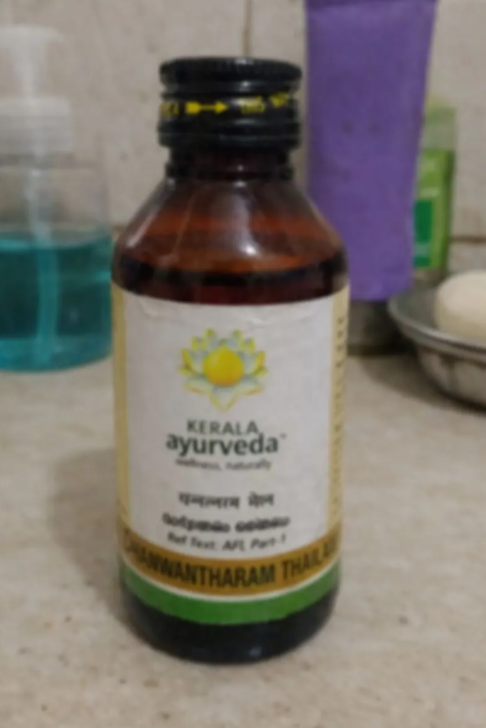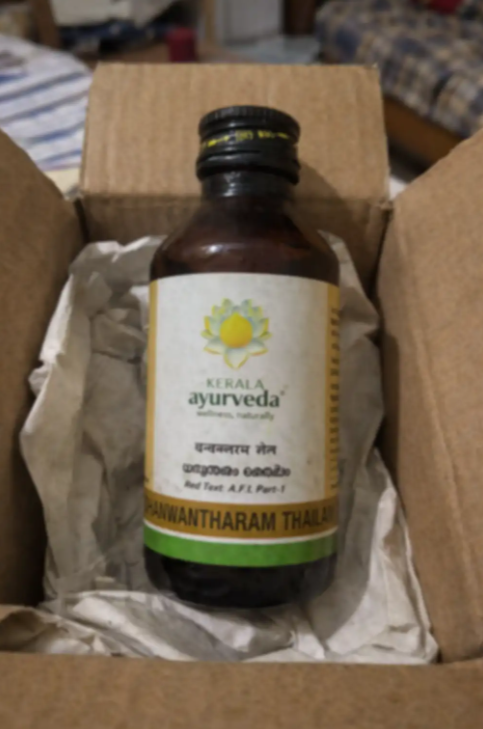Key Benefits of Kerala Ayurveda Dhanwantharam Thailam
- May help ease prenatal and postnatal stress in expectant mothers
- Supports gentle toning of abdominal muscles during pregnancy
- Boosts skin elasticity, helping reduce stretch marks over time
- Relieves dryness and itchiness by deeply moisturizing skin
- Nourishes senses, promoting relaxation and a calm mind
- Enhances overall vitality and energy levels after massage
- Suitable for full-body abhyanga to rejuvenate both men & women
Product Description of Kerala Ayurveda Dhanwantharam Thailam
Kerala Ayurveda Dhanwantharam Thailam is more than a simple massage oil—it's a tender ritual passed down through generations. Named after Lord Dhanwanthari, the legendary god of medicine, this precious blend infuses sesame oil with age-old herbs. A warm abhyanga with this oil can soothe tired muscles, calm frazzled nerves, and prepare the body for childbirth and beyond.
Expectant and new mothers often find pregnancy and postnatal days both blissful and challenging. This oil, oh it brings relief. With each stroke, the aromatic herbs slip into skin, easing tension and nurturing the abdomen. The gentle oil supports uterine strength and helps to maintain skin suppleness—helping reduce the worry about marks later. But don't think it’s only for moms! Anyone can enjoy a few drops of this warming, nourishing elixir.
The ritual feels almost meditative: warm the oil, inhale its earthy aroma, then massage in large circles around the belly. A quick note: always check temperature before applying, you dont want surprises. After half an hour, a warm bath rinses away excess oil, leaving the skin soft, glowing, and more flexible. Over time, regular use offers a sense of groundedness and a subtle lift in mood—whatever season of life you're in.
Key ingredients with descriptions of Kerala Ayurveda Dhanwantharam Thailam
- Country mallow (Bala): Traditionally valued for its warm and strengthening qualities.
- Indian ginseng (Ashwagandha): Known in Ayurveda for supporting tissue nourishment.
- Gooseberry (Amla): A rich source of antioxidants that traditionally fortify skin health.
- Indian bael (Bilva): Revered in classical texts for its balancing and calming nature.
- Sesame oil: The base oil prized for its deep penetration and nourishing properties.
Key uses of Kerala Ayurveda Dhanwantharam Thailam
- Prenatal abdominal massage from the 7th month to help tone the womb
- Postnatal massage starting on day 7 after childbirth to restore strength
- Daily full-body abhyanga for relaxation, circulation boost, and tissue nourishment
- Soothing of stiff joints and muscles after exercise or long days
- Gentle scalp massage to calm the nervous system and relieve tension
- Sensory ritual to uplift mood, reduce anxiety and promote better sleep
How to use Kerala Ayurveda Dhanwantharam Thailam
Take desired amount in a bowl and place in warm water until slightly warm. Sit comfortably, test oil on inner wrist, then gently massage abdomen in large, clockwise circles with light pressure. Continue massage on legs, arms, shoulder and back. Let oil penetrate for 20–30 minutes, then rinse off with warm water. Use daily or as needed for best results.
Safety information about Kerala Ayurveda Dhanwantharam Thailam
- Children: Not recommended for children under 2 years without pediatric advice.
- Pregnant women: Suitable from the 7th month; consult your practitioner first.
- Breastfeeding mothers: Generally safe; avoid direct application on nipples before feeding.
- People with chronic diseases: Seek medical advice before regular use.
- People with allergies: Patch test mandatory; discontinue if irritation occurs.
- Elderly individuals: Use gentle pressure and lower temperature; skin may be delicate.
- Patients taking medications: Check interactions with your healthcare provider.
- People with weakened immunity: Ensure hygiene; avoid broken skin or open wounds.
Additional information about Kerala Ayurveda Dhanwantharam Thailam
Net quantity: 200 ml. Comes in a dark glass bottle to protect the precious oils from light. Store in cool, dry place away from direct sun. Suggested shelf life is 24 months from manufacturing date printed on pack. Keep lid tightly closed when not in use. May naturally solidify at low temperature—simply warm the bottle under lukewarm water before using. Made in Kerala, following traditional methods, cruelty-free, and contains no synthetic fragrances or colors.



